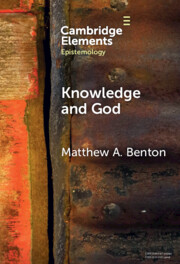Element contents
Knowledge and God
Published online by Cambridge University Press: 01 May 2024
Summary
Information
- Type
- Element
- Information
- Series: Elements in EpistemologyOnline ISBN: 9781009127103Publisher: Cambridge University PressPrint publication: 30 May 2024
References
Accessibility standard: Unknown
Why this information is here
This section outlines the accessibility features of this content - including support for screen readers, full keyboard navigation and high-contrast display options. This may not be relevant for you.Accessibility Information
- 13
- Cited by
